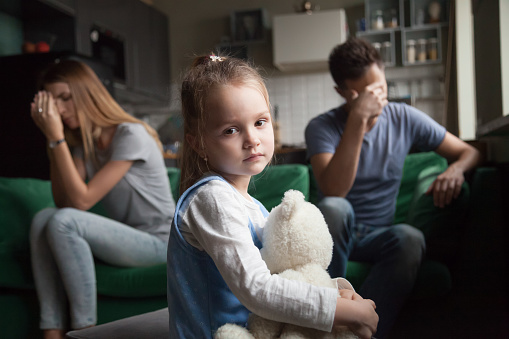Marriage is a respected institution that is not only meant for companionship but also for the raising of children. Couples who take that bold step always hope things will work out well. However, due to varied personalities, religious beliefs, and several factors that threaten the marriage institution, the weak unions crumble, and children are left alone. Hence, this article explores the odds of teen parents staying together.
Studies show that chances of teen parents staying together are high due to various reasons for the couple. They hold on, hoping that the situation is salvageable as time goes by; to some, they opt to stay for the sake of the kids. Hence, the thought of staying with someone outweighs that of staying alone.
Why the odds of teen parents staying together may seem high
The less emotional impact on kids
Parents think children should have two parents living under one roof. Divorce or separation has an emotional impact on the kids. The marital events that follow during and after the divorce compromise the kids’ sense of emotional well-being. The kids get confused and develop fear and anger towards either parent as to why one parent is missing.
Some get worried about their children’s social well-being.
They would be bullied at school if their parents split up, and it will backfire on them by children blaming them. They want to maintain a good relationship with their children. The couple needs to help each other in raising children.
Parenting kids is hard and only works better and easier when both parents are ready to share responsibilities. Children need basic needs such as food, education, clothing, and shelter. Teen parents would rather stay together and provide for their kids than see their children on the streets begging.
The hope for the revival of the relationship
No one gets into marriage with the notion that they will divorce at a particular time. If a couple finds themselves in such a situation, a wise one may want to try and amend the loose ends and give it a second chance. When they look for better ways of resolving their issues, separation becomes a thing of the past.
The cost of separation
The cost that comes with separation renders one helpless. Such charges include; costs of paying legal fees, transportation, new housing, moving expenses, extra purchases, potential loss of income, occupational training costs for the custodial spouse of children, and loss of retirement benefits. Some may not afford to separate and thus would opt to stay.
Avoiding shame and prejudices
To some couples, it becomes difficult to admit the relationship had not worked for fear of public prejudice. Staying alone carries a lot of societal judgments, which scares any couple from separating or divorcing.
They fear children may repeat the same pattern as adults.
Parents are role models for the children. They may want to guard their children against their future relationships. The actions of parents steer children to internalize what they see and conclude that relationships are always bound to fail when there is no cohesion.
Hence, parents strive to maintain the marriage to act good role models to their children. If they go ahead and end it, their separation will approve premarital sex and divorce in children. Later on, he children may never show commitment to romantic relationships due to past experiences.

Benefits of teen parents staying together
Most parents think there would be a more significant negative impact on the children if they split up while they were young. Any parenting mother or father will always consider the child first. That is why you will find some stuck together because of taking care of the kids. The well-being of the children becomes the parents’ worry. Staying together has importance to the children. Hence the odds of teen parents staying together should be high.
Support the health of the child
Their stay aims to support the child’s health by providing basic needs. Providing health care and services, ensuring the child gets enough sleep and a balanced diet. Promote their social, mental, and emotional health and understand and share their feelings.
It ensures positive educational effects.
It is beneficial when the parent finds out about the child’s school progress and attends the parents’ meeting to support school programs and ensure that the child receives affordable education. An emotionally stable child will perform well compared to an emotionally disturbed child.
Guard kids against substance abuse.
There must be the presence of a parent to control the kids’ behavior and movement. As a parent, you know their social interaction and can keep them in check when they stray. Children whose parents are absent may lack keen behavior control and develop delinquent behaviors.
Children have fewer emotional problems.
Guard children against depression and anxiety. Any emotionally disturbed child encounters low social skills. Such kids find it hard to communicate and interact with others. They lack emotional regulation strategies.
Children are less likely to divorce than adults.
As a parent, you are a role model to your kid. What they observe is what they will do when they grow up. They grow up thinking that relationships have issues, and if it does not work out, you call it quits.
Firm financial foundation for the kids
The kids get financial attention, basic needs, education, and other needs.
You all must have the same spending habits. Many relationships break due to finances. Create transparent budgets and do not make unrealistic decisions when it comes to expenditure.

Making the decision
If the odds of teen parents staying together are lean, then divorce is the better option. However, studies show that conflicts between parents visiting together have a more far-reaching impact on the kids than divorce or separation.
We look at the impacts of staying in a high-conflict relationship with the children.
- The teen undergoes mental and intellectual problems.
- The teens develop behavior problems.
- They experience externalizing problems such as delinquent behaviors, aggressiveness, and oppositional. The teen undergoes internalizing issues such as sadness, anxiety, and loneliness. They become depressed, and some have suicidal tendencies.
- The conflicts weaken the parent-child bond and tend to hate one of the parents viewed as the ”bad one.”
- The conflicts disrupt the teen’s health. The teen has difficulty focusing on school work, has disturbed sleep, and becomes unsettled all the time. Some may even develop poor eating patterns due to low self-esteem.
- The conflicts lead to child maladjustment. The teen ends up exhibiting nervousness, emotional overreaction, and deviation. They become careless with school work, turn cruel to their peers, and disobedience becomes the norm.
These emotional instabilities and psychological effects disrupt a child’s development.

Verdict on odds of teen parents staying together
The odds of teen parents staying together become slimmer if they have resolved problems and planned well, and ready to do the parenting of their kids as a couple. Children raised in a stable family are more educated, healthier, happier, and have fewer behavioral issues than those who experience transitions in family structures.
Family instabilities are rising because many couples have children in cohabiting unions. Children from unstable families are likely to suffer from emotional, social, and mental disorders. The kids promote their emotional regulation, behavior regulation and cognitive representations in the absence of parents. Eventually, the children will drop out of school, engage in substance abuse and face depression compared to those from stable families.

